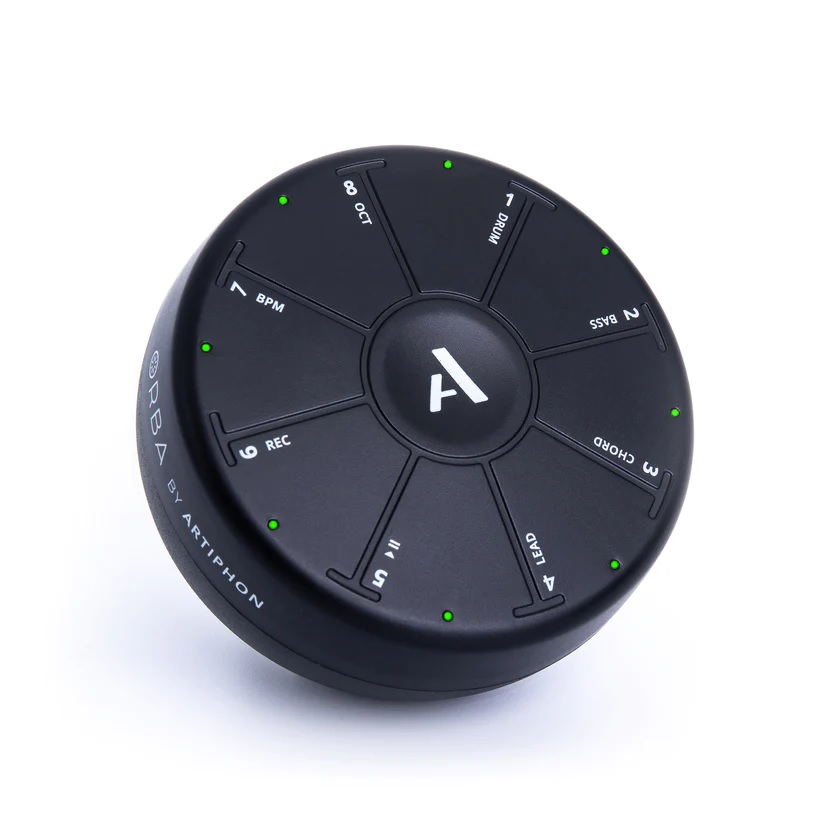Is a bird in the hand worth two in the bush?
I bought an Artiphon Orba (version 1) when the Orba first hit mainstream retailers. Orba implements MIDI Polyphonic Expression (MPE) and transmits MIDI over USB-C or Bluetooth BLE. Might the Orba be an interim MPE controller?
The Orba is pitched as a musical tech toy to while away the hours making beats and songs. If you’ve never held and play one, Orba is the size of a small grapefruit (a large orange?) cut in half. It fits rather neatly in the hand. The top surface is subdivided into eight wedges with a button in the middle of the wedges. [Dang, this does look like a grapefruit prep’ed for breakfast. 🙂 ] The wedges play sounds unless the center button is pressed first, requesting a change in mode (i.e., drum, bass, chord, lead, record, octave change, etc.)
The wedges respond to pressure, up/down swipes and right/left swipes. Orba’s internal sensors respond to tilt and shake. Depending upon the preset voice, all of these gestures warp the current sound — and send MIDI MPE messages. Orba provides haptic feedback through vibration, something I turn off in order to save power.
Orba’s MPE abilities aren’t promoted aggressively although the Orba manual does a decent job of describing its MPE implementation. The Orba app (personal computer or tablet based) has a few parameters to control Orba’s behavior as a MIDI controller:
- MIDI Mode: MPE, Single Channel, Channel-per-part
- Mobile MIDI Mode: Consolidates MIDI into a single port
- Pitch Bend Scaling: 0%, 25%, 50%, 100%
- Orba Sounds: Local OFF
Local OFF is a bit quirky. It doesn’t always turn off the internal synth! I compensate by turning the Orba’s volume all the way down.
Orba’s size and gestural response are the neatest things about Orba as a MIDI controller. Everything is small and self-contained. Under battery power and Bluetooth, you can pretty much fling the Orba around without wires. This assumes, of course, that the destination synth can receive Bluetooth MIDI directly from Orba. This isn’t a problem when using software instruments on iPad, but would be an issue for a non-Bluetooth synth like Modal Skulpt SE.
In typical use as a tech toy, Orba is a four track sequencer. Each track has a preset voice and role: drum, bass, chord, and lead. Drum, bass and lead record (play) individual notes. Chord plays multiple notes. Everything follows a particular musical scale which is set through the Orba app.
This is where use as a MIDI controller is limited. When you hit a wedge in bass, lead or chord modes, you’ll get notes belonging to a pre-defined scale. If you go off-piste in the melody, there isn’t a way to play non-scale tones. Forgot a lot of Beatles tunes or many, many Christmas carols!
Let’s say you want to augment a keyboard controller using only Orba’s gestural control i.e., play notes on the keyboard and bend them with Orba. Forget MPE in that case. The MPE channel and messaging model won’t allow that. An MPE source needs to keep track of the note-to-channel assignment and send certain control messages to the channel associated with the note to be modified. The keyboard and Orba have their own ideas about channel assignment and you can’t “cross the streams.” [Sometimes you need to cross the streams, Egon. 🙂 ]
All is not lost, however. I had fun in single channel mode with Audio Modeling SWAM Flute and SWAM Cello. Cello is a real kick; playing vibrato with finger gestures is totally cool.
Whatever MIDI mode, Orba sends MIDI note ON (note OFF) when a wedge is touched (released). There needs to be a way to tell Orba, “Don’t send MIDI note ON and OFF”. You can kinda, sorta work around this issue by touching a wedge and leaving it there. Sure, you get the initial note ON, but then the keyboard controller overrides the initial note value. I can’t see doing this in front of a live audience (congregation). In the studio, yeah, especially if you can delete unwanted notes from a recorded MIDI track.
At a meta-level, I wonder if companies have actual musicians try their prototypes during advanced development? All MIDI controllers have these little frustrations and limitations. Argh! Once again, please add scripting and let us make fixes. Developers simply cannot anticipate all usage models and modes!
Copyright © 2023 Paul J. Drongowski

